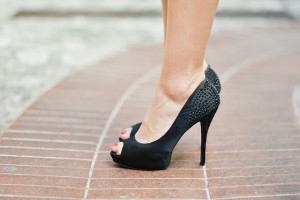 Thanks to an actress called Nicola Thorp, the ridiculousness of the rather mad ‘you must wear high heels at work’ debate has been thrust into the public consciousness of the UK . If you’re UK based and don’t know the story you’ve probably been living under a rock, but the basics are that Nicola, a resting actress doing some temp work, was told that, to be a receptionist at global accountancy and consultancy firm PWC, she would have to wear high heels. She refused, and told her story to the media, thus inspiring a huge discussion about the sexism of it all.
Thanks to an actress called Nicola Thorp, the ridiculousness of the rather mad ‘you must wear high heels at work’ debate has been thrust into the public consciousness of the UK . If you’re UK based and don’t know the story you’ve probably been living under a rock, but the basics are that Nicola, a resting actress doing some temp work, was told that, to be a receptionist at global accountancy and consultancy firm PWC, she would have to wear high heels. She refused, and told her story to the media, thus inspiring a huge discussion about the sexism of it all.
One of the best commentaries on this I have read appeared in The Guardian, where the writer, Caroline Cadwalladr (she must be Welsh with a name like that), rails against the curse of the high heel as an instrument of deformity, and comments on why we should speak out about it.
I adore beautiful shoes, and heels, but for the last 10 or 15 years I have had to leave them behind. I have hyper-mobile (i.e. weak) knee and ankle joints, so I am unstable at the best of times. Your high heel makes me more unstable. The hyper mobility has brought with it various knee and foot problems which I can only keep in check by wearing orthopaedic insoles, and you try wearing those with a pair of high heels! It’s really, really tricky, because I now have to wear extra wide shoes, and finding elegant versions of such things is a nightmare. I have heel-envy as only someone who can only wear old lady shoes can have heel-envy.
What Are The High Heels At Work Issues?
It seems to me that there are several issues to disentangle from this whole story. The most obvious is the illogical attitudes of certain organisations to the professional dress code. Back in the day, it was regarded as bad form if women had bare legs, or wore sleeveless or low plunging blouses or tops. In certain organisation this is still the case.The reason? Immodesty. Now can someone please explain what is modest about a 3-4 inch heel? And in those same organisations, women were (and often still are) expected to wear skirts, not trousers. Trousers – which are generally so much more practical – were regarded as women trying to be too much like men; not feminine enough.
I’m not an image consultant, but I do believe this stems from a kind of sexism where women are expected to look the little woman. OK, Louis XIV wore heels for dancing and other courtly activities, and men wore heels to stop their feet sliding through their stirrups, but in general the men avoided the 4 inch plus heel. High heels make you unstable, and thus vulnerable and, er… womanly. Similarly pencil skirts (yes, some organisations still expect their women to wear pencil skirts). Have you ever tried to move at any speed in a pencil skirt? Like the high heel, it emphasises our femininity, and our bums.
We women also have to bear some responsibility in all this. For many women, heels signify empowerment, they raise us up, they make us feel taller, grander, more feminine, sexy and, yes, professional too. We choose to wear the bloody things on nights out, to weddings and garden parties (as your stiletto sinks into the damp grass). Why then do we complain when male-dominated institutions say we should wear heels to work, given we love them so much out of work?
While many men are supportive of the women who are protesting about the high heels at work issue, some still think we should just suck it up. The argument often runs along the lines of ‘women have more dress choice and men have to conform to dress codes too’ lines. This little gem from news.com in Australia is a great example. But of course, men have not had to put up with many years of sexism and inequality, and I think many of them feel challenged when women stop saying nothing, which is our more usual habit, and speak out for what we think is our right. In this case the right to choose to have healthy, comfortable feet.
Today if a client has something to say about my shoes (and it has happened), I talk about my infirmity. I no longer feel the need to hide it, and it generally embarrasses them into an uncomfortable silence. I have turned down job offers from organisations who told me I had to conform to a no-trousers dress code, or they didn’t like my jewellery. Because the way I saw it, and still see it, if you work full time, you spend more of your waking hours at work than you do with your partner or family. If your values and those of your employer don’t coincide, or at least match on the points that really matter, that’s an awful long time to be spending in that environment.
Photo via Pixabay under Creative Commons Licence
